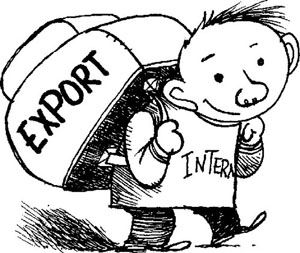
Should We Regulate Services Trade?
Originally published in the Journal of Commerce, August 7, 1984. Used with permission of Michael R. Czinkota and the Journal of Commerce.
In the past few months the United States has reached agreement with its allies on tigher controls on computer exports, including for the first time controls on software trade, and has proposed regulating exports of certain services to the security forces of countries that aid or abet international terrorism.
The international trade community should pay close attention to these two events, for although they seem to be unrelated and to address quite narrowly defined issues, they mark the beginning of a new era: we are beginning to regulate the export of services.
It may seem far-fetched to search for major implications in these minor regulations and proposals. Experience teaches us, however, that most major regulatory efforts begin with relatively small and non-controversial steps.
One could react to these initial efforts with outrage at yet another type of ill-advised government regulation, but such a reaction would lack perspective. In the past decade, as the United States has become an increasingly services-based economy, exports of services have grown in importance, representing an area in which the United States has a substantial comparative advantage internationally.
As long as the United States is willing to regulate the exports of products in order to enhance its national security or foreign policy objectives, it seems only reasonable to develop regulations for services, especially when one considers that many services have potential military usefulness.
At the same time, however, U.S. off icials charged with developing a policy for regulating trade in services need to think of the consequences of such controls. Just as the country was able to build a lead in products trade in the late 1940s and 1950s that resulted in strong international economic and political ties for 30 years, it now has a chance to build strong and lasting services linkages with countries around the world.
In order to be successful in this process, however, we need to realize that, unlike the 1950s, the 1980s are a time of great competition in international trade, and many other countries are rapidly increasing their service capabilities. If we hesitate too long or regulate too much, we may miss a unique opportunity to resume an eminent leadership position in world trade.
It is imperative, therefore, that the United States move into the area of services regulation with its eyes open. We should not develop regulations in an ad hoc, haphazard, indirect, or fragmented fashion and then apply them to entire industries by analogy.
We need to develop a regulatory policy that is well defined, enforceable, and tolerable to U.S. industries and allies. Such an approach can serve U.S. national security and foreign policy goals without endangering our economic competitiveness abroad.
